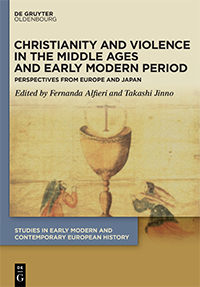Christianity and Violence in the Middle Ages and Early Modern Period
Perspectives from Europe and Japan
Fernanda Alfieri, Takashi Jinno (edd)

Numero: 3
Editore: De Gruyter Oldenbourg
Città: Berlin/Boston
Anno: 2021
Cartaceo
Libro
The volume explores the relationship between religion and violence in Europe from the Middle Ages to the Early modern period, involving European and Japanese scholars. It investigates the ideological foundations of the relationship between violence and religion and their development in a varied corpus of sources (political and theological treatises, correspondence of missionaries, pamphlets, and images).
Indice
Contents
Fernanda Alfieri and Takashi Jinno
Introduction
I. Seminal ideas
Debora Tonelli
From Divine Violence to Religious Violence. A Socio-Political Interpretation of Exodus
Vincenzo Lavenia
Holy Scripture, Theology, and Violence. Terror and Samson in the Early Modern Era
Serena Ferente
“Nothing violent can last”: Nature, Violence, and Political Legitimacy in a Scholastic Formula
Takashi Jinno
Tyrannicide as an Act of Divine Justice. The Doctrines of Tyrannicide of John of Salisbury and Juan de Mariana
II. Changing Meanings
Fernanda Alfieri
“Violentia” and the Devil. Early Modern Narratives of Demonic Possession and Catholic Anthropology
Morihisa Ishiguro
Violence and Covenant in Machiavelli’s Thinking
Taku Minagawa
Peace According to the Political Theologians of the Holy Roman Empire at the End of the Thirty Years’ War
III. Theories and Practices
Yuga Kuroda
Reconquista and Muslim Vassals. Religion, Politics, and Violence on the Medieval Iberian Peninsula
Kazuhisa Takeda
The Global Expansion of Christian Violence in the Old and the New World. From Early Church Fathers to the Jesuits
Atsuko Hirayama
Religion and Violence in the Christian Mission in Early Modern Japan
Giovanni Ciappelli
The Privateering by the Knights of Saint Stephen against Turks and Barbary Pirates. Violence and Religion in Seventeenth-Century Printed News Narratives
Contributors
Parole chiave
- Early modern Europe
- Violence
- Japan
- War
- Politics
- Theology

